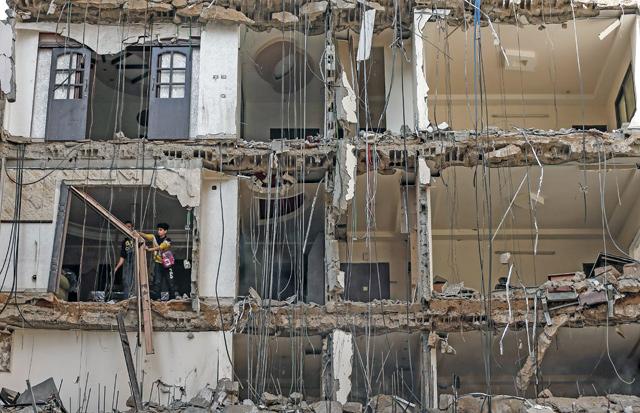You are here
Israel defence minister quits after ceasefire, gov’t in turmoil
By AFP - Nov 15,2018 - Last updated at Nov 15,2018

Palestinians clear rubble in a building damaged by an Israeli air strike earlier this week in the Gaza Strip on Wednesday (AFP photo)
OCCUPIED JERUSALEM — Israeli Defence Minister Avigdor Lieberman announced his resignation on Wednesday and called for early elections after a sharp disagreement over a Gaza ceasefire deal, throwing the government into turmoil.
Lieberman also said his party was quitting Prime Minister Benjamin Netanyahu's coalition, leaving the premier with only a one-seat majority in parliament.
Elections are not due until November 2019, but Lieberman's resignation increases the likelihood of an earlier vote.
"What happened yesterday — the truce combined with the process with Hamas — is capitulating to terror," Lieberman told journalists in explaining his reasons for resigning.
"What we're doing now as a state is buying short-term quiet, with the price being severe long-term damage to national security."
He added later: "We should agree on a date for elections as early as possible."
Netanyahu has defended Tuesday's ceasefire deal that ended the worst escalation between Israel and Gaza since a 2014 war.
An official from Netanyahu's Likud Party hit back at speculation that early elections would be called and said the prime minister would take charge of Lieberman's portfolio at least temporarily.
"There's no obligation to go to an election in this time of security sensitivity," the official said on condition of anonymity.
A Likud spokesman said later in the day that Netanyahu had begun consultations with heads of parties in his coalition to stabilise it.
The party of far-right Education Minister Naftali Bennett, a Netanyahu rival, was threatening to withdraw from the coalition if he was not given the defence portfolio.
'Begged for ceasefire'
Lieberman, a security hardliner, heads the right-wing Yisrael Beitenu Party, which holds five seats in the 120-seat parliament, the Knesset.
Before taking over as defence minister, he said he would give Hamas leader Ismail Haniya 48 hours to hand over two detained Israeli civilians and the bodies of soldiers killed in the 2014 war “or you’re dead”.
He later backed off and said he was committed to “responsible, reasonable policy”.
The ceasefire held on Wednesday, but Netanyahu was seeking to combat criticism of the decision.
Beyond Lieberman’s resignation, several hundred Israelis living near the border with Gaza protested on Tuesday night to call for further action against its Islamist rulers Hamas.
Netanyahu defended his strategy and said: “Our enemies begged for a ceasefire.”
“In times of emergency, when making decisions crucial to security, the public can’t always be privy to the considerations that must be hidden from the enemy,” he said at a ceremony on Wednesday.
Hamas portrayed the ceasefire as a victory and thousands of residents of the blockaded enclave took to the streets late Tuesday to celebrate.
On Wednesday, Gazan demonstrators burned pictures of Lieberman and sweets were handed out in the streets, while Hamas called his resignation a “victory”.
The Egyptian-brokered truce was announced by Gaza groups, including Hamas, on Tuesday.
A diplomatic source familiar with the agreement said it involved returning to arrangements put in place following the 2014 war, but warned: “The situation remains very precarious and can blow up again.”
“What we have seen in the past 48 hours was very dangerous and no efforts should be spared to avoid similar flare-ups.”
Blown covert operation
The violence saw seven Gazans killed in 24 hours as Israeli strikes hit targets and flattened buildings, sending fireballs and plumes of smoke into the sky.
Sirens wailed in southern Israel as barrages of rocket and mortar fire were unleashed, sending residents rushing to shelters.
Around 460 rockets and mortar rounds were fired at Israel, the most ever in such a brief time period, the army said.
An anti-tank missile hit a bus near the Gaza border that Hamas says was being used by Israel’s army. An Israeli soldier was severely wounded.
In all, some 27 Israelis were wounded, three of them severely.
A Palestinian labourer from the occupied West Bank was killed when a rocket hit a building in the Israeli city of Ashkelon.
The violence had begun on Sunday with a botched Israeli special forces operation inside the Gaza Strip that turned deadly and prompted Hamas to vow revenge.
The clash that resulted from the blown operation killed seven Palestinian militants, including a local Hamas military commander, as well as an Israeli forces officer.
This week’s escalation came despite Netanyahu’s decision to allow Qatar to transfer millions of dollars in aid to Gaza for salaries as well as fuel to ease a chronic electricity shortage.
The agreements had led to calmer protests along the border after months of deadly unrest.
But those cash transfers also drew criticism from Netanyahu’s own government, and Lieberman slammed them in announcing his resignation.
Related Articles
OCCUPIED JERUSALEM — Israeli Prime Minister Benjamin Netanyahu said on Sunday it would be "unnecessary and wrong" to call snap polls, as he
OCCUPIED JERUSALEM — Israel's government decided on Monday to hold early elections in April with Prime Minister Benjamin Netanyahu strugglin
OCCUPIED JERUSALEM — Israeli opposition leader Tzipi Livni accused Prime Minister Benjamin Netanyahu on Wednesday of over-dramatising the ar















